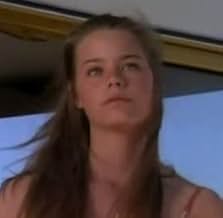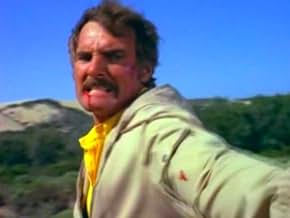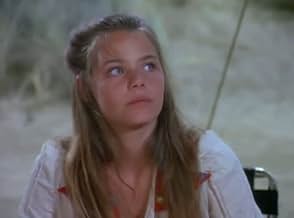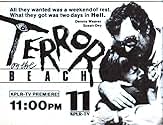Agrega una trama en tu idiomaA family's outing turns out badly as they are terrorized by a gang of young thugs.A family's outing turns out badly as they are terrorized by a gang of young thugs.A family's outing turns out badly as they are terrorized by a gang of young thugs.
Jacqueline Giroux
- Mickey
- (as Jackie Giroux)
Carole White
- Helen
- (as Carol Ita White)
- Dirección
- Guionista
- Todo el elenco y el equipo
- Producción, taquilla y más en IMDbPro
Opiniones destacadas
If you get the Fox Movies channel, they will sometimes run this fine film shot during Weaver's tenure as Sheriff McCloud in '73. It is a slow film not unlike many made-for-tvs of this period, but enjoyable nonetheless. There are great low-angle shots of beautiful blue skies, dune-grass in the foreground and colorful swirls of billowing hippie tents throughout. The action is standard but you watch these films for that early '70s atmosphere and inspiration not for thrills. The hippies are cool and there are some cute girl hippies as well with long bleached hair and smoothe legs. Remember, during this period, fashions were excellent previews of the '93-'97 retro-movement - only better. Also featured is a young and cute Susan Dey from Partridge family fame so... watch for that all you tv lechers.
Hippie band menaces suburban family camping at the beach.
A made for TV quickie— it's not even hard to spot the commercial pauses. Probably took them no more than 5 days to shoot. One thing for sure-- they didn't have to build any sets. No sir, no phony surf or projection screens here; it's all genuine SoCal coastline.
However, the storyline is something else, more like a respectable person's bad dream about stereotyped hippies. So why does the Manson-like band harass good citizen Weaver and his family. Unless I missed something, we're never told, which sort of blows a hole through the middle of the plot. I guess we're to assume it's a culture clash with hippies as the inexplicable bad guys. My guess is the script was a rush job without time to plug the holes.
In fact, just what the band is trying to do remains murky throughout. They taunt and leer, drive recklessly, trash the campsite, and even tip over the camper. But who knows why—just hippie fun, I guess. Meanwhile, citizen Weaver finally goes from suburban Milktoast to enraged righteousness, and we wonder what took him so long. I'm sensing a parable here that sort of fits in with the Charles Bronson vigilante movies of the time-- Death Wish (1974)-- where low-life's rape and murder Bronson's family triggering his own murderous rage. But of course, that's much too brutal for a TV movie. So we get low-life vandals, instead.
Anyway, the narrative manages some tension as the provocations mount; the acting is good; and I almost got a sunburn from watching. Then too, the bickering father-son, mother- daughter, amount to a realistic touch. But unless you want a time-passer or just don't like hippies, skip it.
A made for TV quickie— it's not even hard to spot the commercial pauses. Probably took them no more than 5 days to shoot. One thing for sure-- they didn't have to build any sets. No sir, no phony surf or projection screens here; it's all genuine SoCal coastline.
However, the storyline is something else, more like a respectable person's bad dream about stereotyped hippies. So why does the Manson-like band harass good citizen Weaver and his family. Unless I missed something, we're never told, which sort of blows a hole through the middle of the plot. I guess we're to assume it's a culture clash with hippies as the inexplicable bad guys. My guess is the script was a rush job without time to plug the holes.
In fact, just what the band is trying to do remains murky throughout. They taunt and leer, drive recklessly, trash the campsite, and even tip over the camper. But who knows why—just hippie fun, I guess. Meanwhile, citizen Weaver finally goes from suburban Milktoast to enraged righteousness, and we wonder what took him so long. I'm sensing a parable here that sort of fits in with the Charles Bronson vigilante movies of the time-- Death Wish (1974)-- where low-life's rape and murder Bronson's family triggering his own murderous rage. But of course, that's much too brutal for a TV movie. So we get low-life vandals, instead.
Anyway, the narrative manages some tension as the provocations mount; the acting is good; and I almost got a sunburn from watching. Then too, the bickering father-son, mother- daughter, amount to a realistic touch. But unless you want a time-passer or just don't like hippies, skip it.
I remember this one from when it played on TV when I was about five, but I saw it again recently on the Fox Channel. Dennis Weaver is the main star playing basically the same role he played in "Duel"--a mild-mannered, middle-aged guy whose manhood is tested when he suddenly finds himself in an escalating, completely irrational conflict--except that instead of facing a psychotic truckdriver, Weaver this time is menaced by a bunch of annoying hippies. He also has his whole family with him, so the movie is also similar to both the earlier "Hot Rod to Hell" and the later "The Hills Have Eyes", except that instead of JD hotrodders or crazed cannibals the villains are, uh, a bunch of annoying hippies. And that's the problem. These guys are not exactly the Manson family--all they do is eat the family's food, shake their camper, make strange sound effects with stereo equipment, and do weird things with mannequins. Basically, they "freak the squares." But since the movie is told entirely from the point of view of the "squares" who are being "freaked", it's all ridiculously melodramatic and reactionary. There is no real violence and no sex (although it does feature a young Susan Dey in a bikini). Oh well, what do you expect from a crappy 70's TV movie?
TV-made melodrama appears to be a smaller-scaled variation of "Straw Dogs", yet also tends to resemble the cheesier "Hot Rods to Hell". Dysfunctional family--older dad and mom, accompanied by their two college-age kids--take a camping trip to the beach but run afoul of sadistic hooligan teenagers (dressed in hippie garb reminiscent of the Manson followers). Dennis Weaver's complacent father learns to fight back after his family's safety is threatened, but why are these delinquents so obsessed with terrorizing the straight-laced clan? And why do they always seem two-steps ahead of not only Weaver but also the beach patrol? Writer Bill Svanoe's negligence in explaining the situation at hand doesn't seem unintentional at all; he appears to harbor a fear of hippies/irrational kids in general, no doubt propelled by the headlines of the day. His teleplay bulldozes straight on to a rather predictable showdown, one that indicates to us that the family who fights together stays together. Nevertheless, it's an engrossing scenario, helped immeasurably by several good (if occasionally overwrought) performances.
for the time as other reviews have mentioned, the idea has its moments, Dennis Weaver (of Spielberg's "Duel" fame) has believability as always playing the victimized average American 70's dad getting abused by some kind of horrific reality. Beyond his control, the world and its people take on sinister tendrils and horrors.
Susan Dey and Kristoffer Tabori are the siblings, off at college but not happy, accompanying Weaver and their mom to a day trip on Pismo Beach. The mom is well-played by the understated Estelle Parsons.
While the psychological undertones are there, the action is not delineated, it starts with a good suspense premise, but sort of tapers to a slow end. Look for veteran actor Henry Olek as disenfranchised hippie, Jerry the leader ostensibly is a Charles Manson-like cult figure. Although other than their garb, aimlessness and need for a "family" there is fist-fighting and wrestling, no murder. The theme of "survival of the fittest" is intimated and could have been more explored.
I did not grow up in the 70's but have studied the films and actors prevalent at that time. Also the political and economic climate as well as gas lines, recessions layoffs and a popular book my Dad had, "The screwing of the average man". It seems that history repeats itself. We are now in a similar recession, people are getting desperate, the fallout is happening now from another war, disenfranchised people and the poor in America....it goes on. But back to the film. Younger generations including my own have interest in the 70s because like it or not we have to learn from history.
Recommended. 8/10.
Susan Dey and Kristoffer Tabori are the siblings, off at college but not happy, accompanying Weaver and their mom to a day trip on Pismo Beach. The mom is well-played by the understated Estelle Parsons.
While the psychological undertones are there, the action is not delineated, it starts with a good suspense premise, but sort of tapers to a slow end. Look for veteran actor Henry Olek as disenfranchised hippie, Jerry the leader ostensibly is a Charles Manson-like cult figure. Although other than their garb, aimlessness and need for a "family" there is fist-fighting and wrestling, no murder. The theme of "survival of the fittest" is intimated and could have been more explored.
I did not grow up in the 70's but have studied the films and actors prevalent at that time. Also the political and economic climate as well as gas lines, recessions layoffs and a popular book my Dad had, "The screwing of the average man". It seems that history repeats itself. We are now in a similar recession, people are getting desperate, the fallout is happening now from another war, disenfranchised people and the poor in America....it goes on. But back to the film. Younger generations including my own have interest in the 70s because like it or not we have to learn from history.
Recommended. 8/10.
¿Sabías que…?
- ErroresThere is a clear change from exterior scenes shot on the beach to beach scenes shot in a studio. The lawn chairs on the beach are a light color. In the studio scenes, the lawn chairs are black.
- Citas
Neil Glynn: Hey... are these trees? Hm?
Arlene Glynn: They are trees.
Neil Glynn: Hm-hm. You know, the last time we were by here, it seemed like they were smaller. You remember these trees, kids?
DeeDee Glynn: Oh, you don't forget trees like these, dad.
Steve Glynn: I think I remember them, dad.
Selecciones populares
Inicia sesión para calificar y agrega a la lista de videos para obtener recomendaciones personalizadas
Detalles
- Fecha de lanzamiento
- País de origen
- Idioma
- También se conoce como
- Terror en la playa
- Locaciones de filmación
- Pismo Beach, California, Estados Unidos(location)
- Productoras
- Ver más créditos de la compañía en IMDbPro
- Tiempo de ejecución1 hora 14 minutos
- Color
- Relación de aspecto
- 1.33 : 1
Contribuir a esta página
Sugiere una edición o agrega el contenido que falta




























